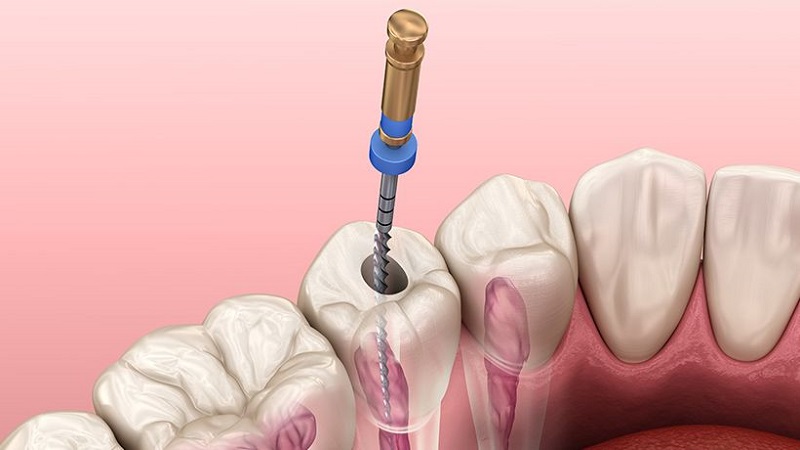Frequently asked questions about denervation and endodontic treatment
In the continuation of today's article, Dr. Hossein Borjian's website The best cosmetic dentist in Isfahan We will address the common questions of nerve extraction and endodontic treatment.
Does denervation hurt?
Although nerve rooting may seem scary, the experience is similar to a deep filling. during root canal You do not feel pain because you are under the influence of anesthesia. They will also give you painkillers to take if needed. This pain is controlled with common pain relievers such as acetaminophen or ibuprofen.
You may be given antibiotics before the nerve removal to kill the bacteria.
According to a review of 72 other studies conducted on patients who underwent denervation, it was found that the pain before the treatment was high in these people, but within a day after the treatment, it decreased to an average level and within a week After the treatment, it significantly subsided and became minimal.
Can a tooth be extracted during pregnancy?
If you are pregnant, no elective treatment is recommended (such as cosmetic dental treatments) Don't do it, but necessary dental treatments should be done. Nerve removal is a treatment that should not be postponed at any stage of pregnancy. However, due to the need for X-rays, it is recommended to do this in the second trimester of pregnancy.
Suggested content : Different methods of gum surgery
Is it in quarantine? (Because of the corona disease) Can you hold hands for dental problems?
For essential dental treatments, you must see a dentist as soon as possible. Among the cases for which it is necessary to refer are::
- Swelling of the gums, cheeks or face that spread. And they reached the neck or the eyes or the bottom of the mouth.
- Severe pain that makes you lose sleep or focus.
- A mouth ulcer that has not healed after two weeks.
- Bleeding more than 20 minutes after tooth extraction that does not stop even with firm pressure of the jaw on the dressing.
- Broken teeth that caused pain or possible injury to the cheek or tongue.
- Tooth extraction
- Bleeding due to facial injury

What is the difference between denervation of front teeth and wisdom teeth or large molars?
For nerve extraction, a hole must be made in the crown of the tooth so that the dentist can access the pulp. For the front teeth, this hole is usually made on the back surface of the tooth, but for the back teeth, the hole is usually made on their upper surface, that is, the surface of the tooth with which we chew food..
After the work is finished, the hole created for the front teeth is closed with dental filling materials. Usually, temporary materials are used until the dental crown is prepared and attached to the tooth.. However, sometimes veneers are not necessary for the front teeth because there is not much pressure on these teeth . But for back teeth that are under a lot of pressure, a crown is often needed to prevent the tooth from breaking and chipping.
In order to cover the front tooth that has been denervated, care must be taken in the beauty of the restoration because its color difference with other teeth can affect the beauty of the smile.. Even when the veneer is chosen exactly the same color as the adjacent teeth, due to the gradual color change of other teeth and the veneer's resistance to color change, color differences may occur over time.. In this case, this problem can be solved by whitening the teeth.
Another important difference in the difference between the innervation of front and back teeth is the number of their roots. Front teeth with fewer roots (Usually a root contains a root canal) have. Usually, small molars or premolars and back teeth have two or three roots, each containing one or two root canals.. The more roots there are, the longer the denervation treatment will be. The treatment may not be completed in one session and several sessions may be required to complete the treatment.
How is tooth extraction done at home?
Tooth extraction at home is a natural method that is performed at home to relieve pain and tooth root infection. This method is temporary and relieves the infection of the root of the tooth to some extent, you must visit the dentist as soon as possible..
The Instagram page of Dr. Hossein Borjian, the best cosmetic dentist in Isfahan
Nerve pain relief methods
In these cases, you can use a cold water compress. When your tooth becomes inflamed and infected, you can reduce the pain and inflammation of your tooth by using ice or ice packs..
Turmeric is another thing that reduces inflammation and toothache because turmeric has strong anti-inflammatory properties.. You should mix turmeric with a small amount of water until it becomes a paste, then dip a cotton ball in it and place it on the gum that hurts.. You should do this 3-4 times a day to reduce the inflammation and pain of your tooth.
Using tea tree oil can also reduce tooth nerve pain. You can put a few drops of this oil on the part that hurts and massage it. Or mix it with water and swirl it in your mouth. Do this 3 to 4 times.
Using salt water is one of the famous ways of toothache. Salt water has antiseptic properties and reduces tooth root infection. You should also do this 3 to 4 times a day.
How long is the life of a denervated tooth?
In the treatment of tooth denervation due to Tooth Decay and root infection, they remove the pulp of the tooth and fill it with materials. Because this tooth is damaged, it is weaker than other healthy teeth, that's why, no matter how much it is treated, it still has a shorter life than other teeth. A denervated tooth lives for 10 to 15 years.. Of course, you can increase its durability by using dental veneers or other methods.
Ways of communication with the specialized dental center of Najm
Attention :
- The scientific accuracy of the above published material should be confirmed by the patient's personal consultation with Dr. Borjian.
- This article is managed and published by the site admin.



